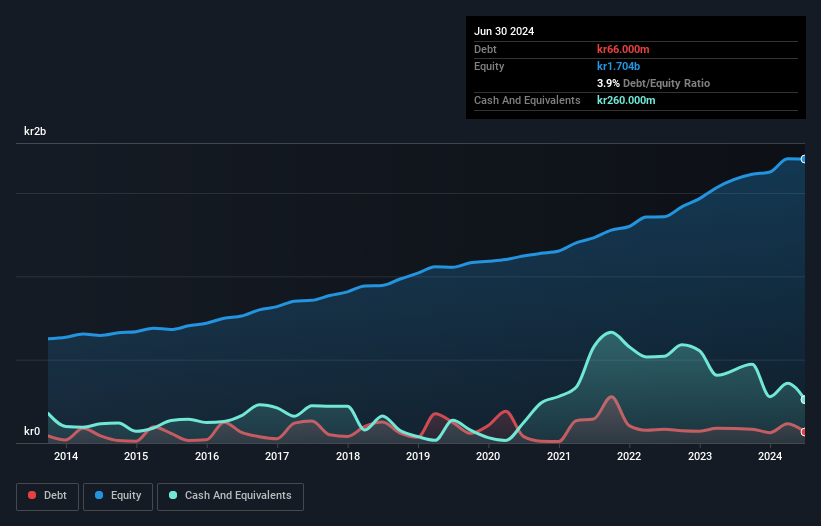KABE Group AB (publ.) (STO:KABE B) Seems To Use Debt Quite Sensibly
The external fund manager backed by Berkshire Hathaway's Charlie Munger, Li Lu, makes no bones about it when he says 'The biggest investment risk is not the volatility of prices, but whether you will suffer a permanent loss of capital.' So it might be obvious that you need to consider debt, when you think about how risky any given stock is, because too much debt can sink a company. We note that KABE Group AB (publ.) (STO:KABE B) does have debt on its balance sheet. But should shareholders be worried about its use of debt?
What Risk Does Debt Bring?
Debt assists a business until the business has trouble paying it off, either with new capital or with free cash flow. Ultimately, if the company can't fulfill its legal obligations to repay debt, shareholders could walk away with nothing. However, a more common (but still painful) scenario is that it has to raise new equity capital at a low price, thus permanently diluting shareholders. Of course, the upside of debt is that it often represents cheap capital, especially when it replaces dilution in a company with the ability to reinvest at high rates of return. When we examine debt levels, we first consider both cash and debt levels, together.
Check out our latest analysis for KABE Group AB (publ.)
What Is KABE Group AB (publ.)'s Debt?
You can click the graphic below for the historical numbers, but it shows that KABE Group AB (publ.) had kr66.0m of debt in June 2024, down from kr83.0m, one year before. However, it does have kr260.0m in cash offsetting this, leading to net cash of kr194.0m.

How Healthy Is KABE Group AB (publ.)'s Balance Sheet?
According to the last reported balance sheet, KABE Group AB (publ.) had liabilities of kr836.0m due within 12 months, and liabilities of kr142.0m due beyond 12 months. Offsetting these obligations, it had cash of kr260.0m as well as receivables valued at kr625.0m due within 12 months. So its liabilities outweigh the sum of its cash and (near-term) receivables by kr93.0m.
Given KABE Group AB (publ.) has a market capitalization of kr2.98b, it's hard to believe these liabilities pose much threat. However, we do think it is worth keeping an eye on its balance sheet strength, as it may change over time. Despite its noteworthy liabilities, KABE Group AB (publ.) boasts net cash, so it's fair to say it does not have a heavy debt load!
But the other side of the story is that KABE Group AB (publ.) saw its EBIT decline by 3.4% over the last year. That sort of decline, if sustained, will obviously make debt harder to handle. When analysing debt levels, the balance sheet is the obvious place to start. But you can't view debt in total isolation; since KABE Group AB (publ.) will need earnings to service that debt. So when considering debt, it's definitely worth looking at the earnings trend. Click here for an interactive snapshot.
Finally, a company can only pay off debt with cold hard cash, not accounting profits. KABE Group AB (publ.) may have net cash on the balance sheet, but it is still interesting to look at how well the business converts its earnings before interest and tax (EBIT) to free cash flow, because that will influence both its need for, and its capacity to manage debt. Over the last three years, KABE Group AB (publ.) reported free cash flow worth 14% of its EBIT, which is really quite low. For us, cash conversion that low sparks a little paranoia about is ability to extinguish debt.
Summing Up
We could understand if investors are concerned about KABE Group AB (publ.)'s liabilities, but we can be reassured by the fact it has has net cash of kr194.0m. So we don't have any problem with KABE Group AB (publ.)'s use of debt. The balance sheet is clearly the area to focus on when you are analysing debt. However, not all investment risk resides within the balance sheet - far from it. Case in point: We've spotted 1 warning sign for KABE Group AB (publ.) you should be aware of.
If you're interested in investing in businesses that can grow profits without the burden of debt, then check out this free list of growing businesses that have net cash on the balance sheet.
Valuation is complex, but we're here to simplify it.
Discover if KABE Group AB (publ.) might be undervalued or overvalued with our detailed analysis, featuring fair value estimates, potential risks, dividends, insider trades, and its financial condition.
Access Free AnalysisHave feedback on this article? Concerned about the content? Get in touch with us directly. Alternatively, email editorial-team (at) simplywallst.com.
This article by Simply Wall St is general in nature. We provide commentary based on historical data and analyst forecasts only using an unbiased methodology and our articles are not intended to be financial advice. It does not constitute a recommendation to buy or sell any stock, and does not take account of your objectives, or your financial situation. We aim to bring you long-term focused analysis driven by fundamental data. Note that our analysis may not factor in the latest price-sensitive company announcements or qualitative material. Simply Wall St has no position in any stocks mentioned.
About OM:KABE B
KABE Group AB (publ.)
Engages in the construction and sale of caravans, motorhomes, and camping accessories in Sweden, the United Kingdom, Germany, Norway, Finland, Denmark, Poland, and internationally.
Excellent balance sheet average dividend payer.
Similar Companies
Market Insights
Community Narratives



